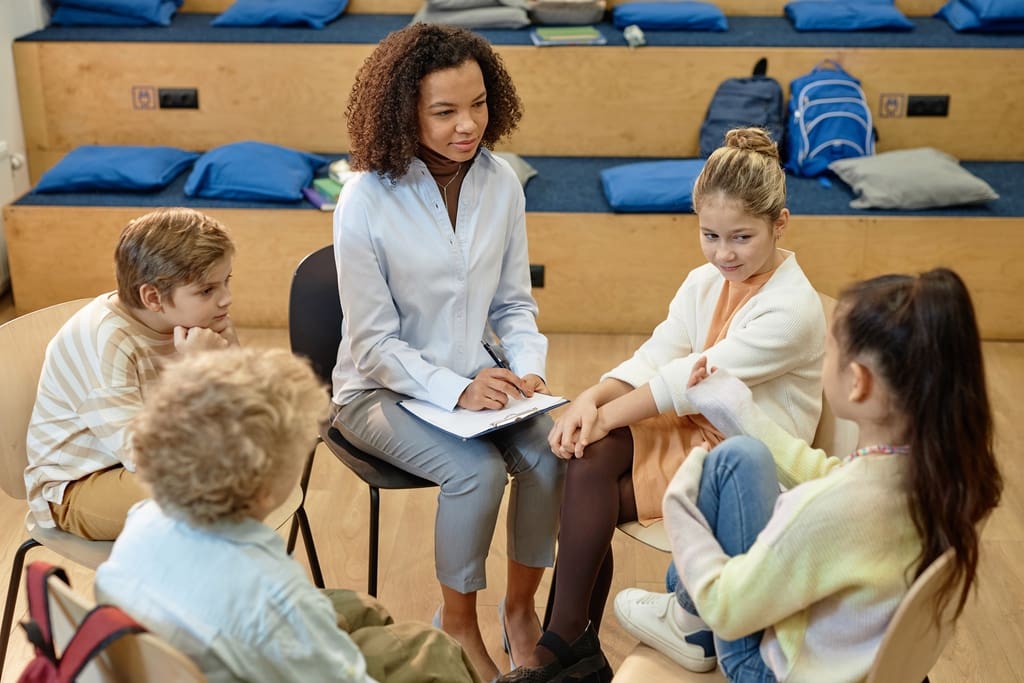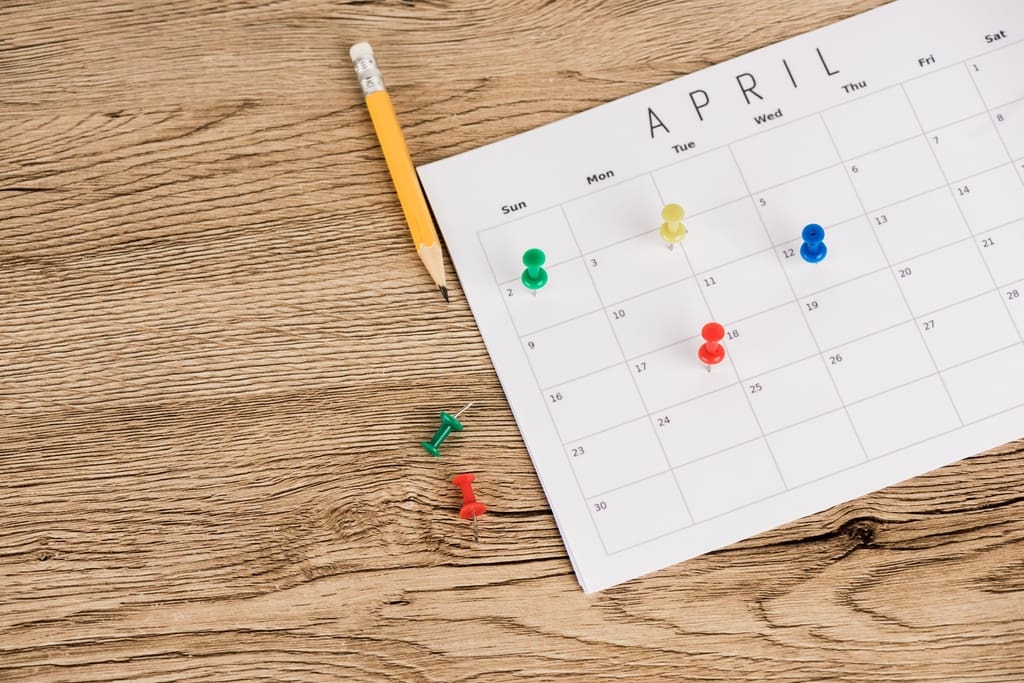
A Step By Step Guide to Help You Plan Your Next Mental Health Awareness Fundraiser

Promoting mental health awareness is vital for fostering a school community that is inclusive, mindful, and committed to accessibility for students. Fundraising to support mental health initiatives helps school groups and PTAs back up these ideals with actions that improve student experience wellness in meaningful ways.
Below, our team at FutureFund walks readers through planning a fundraiser based around mental health awareness. We've also included a downloadable calendar and list of all major mental health milestones for US school groups so you can start planning your next fundraiser now.
How to Use Funds Raised from Mental Health Awareness Events
Although laws in the US prevent PTAs from raising money to distribute to other nonprofits, there are several meaningful ways you can use the proceeds from mental health fundraising events to improve mental health for your school community. Here are a few suggestions:
- Mental Health Education: Fund workshops or seminars for students, teachers, and parents on mental health topics and coping strategies.
- Counseling Resources: Improve counseling services by hiring additional staff or providing special training to existing counselors.
- Wellness Programs: Initiate or enhance activities like yoga, meditation, or art therapy that promote mental well-being.
- Educational Materials: Acquire books and resources on mental health for the school library or classrooms.
- Support Extracurriculars: Fund clubs or activities that offer creative outlets and community building, focusing on mental wellness.
- Safety and Inclusivity Programs: Invest in anti-bullying campaigns, diversity training, or enhancing the physical environment to be more welcoming.
- Parent and Community Engagement: Organize parent workshops and community events to raise awareness and involvement in mental health issues.
- Emergency Mental Health Fund: Set up a fund to help students in urgent need of mental health support who lack resources.

Running a Mental Health Awareness Campaign with FutureFund
Here are the steps involved in running a mental health awareness fundraiser through FutureFund's platform.
Step One: Choose a Date & Theme
- For best results, choose the date of your fundraiser three months before the event. Make sure your event won't conflict with exams, other important school events, or holidays when students and their families will be away.
- Make sure your PTA coordinates with the school ahead of time to make sure there's an appropriate location secured, as well as any school services that need to be coordinated ahead of time (like custodians).
Mental Health Awareness Planning Checklist
Use this checklist template to keep your event planning on track:
Canva Mental Health Awareness Fundraiser Checklist
Step Two: Call for Volunteers
- Put out a call for volunteers two months before the event. Use FutureFund's built-in messaging system to reach the parents and volunteers most likely to participate.
- Make sure your call for volunteers clearly states what date your event will coincide with and how the funds raised will be used.
- Perform background checks for any volunteers from outside the school who need to be present during the event (if required by your school).
Example Volunteer Positions for Mental Health Awareness Fundraisers
The volunteers needed for your fundraiser will depend on the type of event you're planning-but most fundraisers need the following:
- Event Coordinator: Manages overall event planning, coordination, and execution.
- Registration and Check-in Volunteers: These are important for A-Thon fundraisers where students register to collect pledges and participate in activities-as well as ticketed events.
- Audience Coordinators: Essential for public events. These volunteers manage audience seating, ensure safety and comfort, and assist with crowd control.
- First Aid Volunteers: Provide basic first aid and handle any medical situations or emergencies.
- Photographer/Videographer: Captures photos and videos of the event for promotion and as keepsakes for participants.
- Cleanup Crew: Responsible for post-event cleanup, ensuring the venue is left tidy and all equipment is stored properly.
Step Three: Choose Student Incentives
- Incentives motivate students to register for A-Thon events and raise money in the form of pledges.
- It's better to offer incentives to the class or grade that raises the most money than to individual students, as this is a more cost-effective way to motivate groups and can also discourage unhealthy competition. Try an ice cream social or a pizza party for the best results.
Step Four: Create Your Event's Campaign
- Use FutureFund to create your campaign using our customizable templates.
- Make sure your campaign has the following elements:
- A clear and compelling event description that outlines what the money raised will go towards and incentives for participating students.
- Rules for any activities that will be part of the event.
- Permission slips and waivers, if necessary.
- Pricing for any items being sold, or suggested amounts for donation campaigns.
- A leaderboard (for A-Thon campaigns) that shows the grades and teachers for each participating class, along with how much each has raised. These are fully customizable in FutureFund, so you can create custom categories for each event.
- A template (for A-Thons) that students can use to collect pledges from members of the school community. FutureFund provides a sample template for this in all A-Thon campaigns, which you can modify to include the specific details of your event.
Step Five: Announce the Event & Sign-Up Students
- Send out an announcement of your fundraiser to the school community two weeks before the event begins and request that students sign up to participate.
- Share the news in as many places as possible-use the school newsletter, morning announcements, and FutureFund's messaging system to tell everyone why the event is important and how they can be part of it.
- Use FutureFund to send follow-up messages every other day leading up to the event to encourage participation.
- The night before the event, send a final reminder to get the school community excited about the event and encourage them to keep offering support.
Example Emails for Mental Health Awareness Fundraisers
Feel free to customize these templates with specific details about your event, objectives, and the impact you aim to achieve.
Initial Email for Student Sign-Ups
Subject: Join [School Name]'s Mental Health Awareness Fundraiser & Make a Difference!
Hello Students,
We are excited to announce our upcoming Mental Health Awareness Fundraiser! This event is more than just a fundraiser; it's a chance to unite, support our community's well-being, and make a real impact.
Why Join the Mental Health Awareness Fundraiser?
- Engage in meaningful activities to raise mental health awareness.
- Help raise funds for [insert mental health cause or school initiative].
- Win rewards and recognition for your commitment to a vital cause.
How to Sign Up:
Participation is easy and impactful! Click on this link [insert FutureFund link], follow the registration steps, and start preparing for the event. You'll also receive a link to share with family and friends for donations.
Whether you're passionate about mental health or want to support a good cause, this event is for you. Let's come together for mental wellness!
Best regards,
[Your Name]
[School or Name of School Group]
Sample Follow-Up Email to Donors
Subject: Your Support Means the World-[School Name]'s Mental Health Fundraiser Update!
Dear [Donor's Name],
Thank you for your generous contribution to our Mental Health Awareness Fundraiser! Your support is pivotal in educating and creating a supportive environment for our students regarding mental health.
Current Update:
- [Number of participants] students have joined our cause!
- We've achieved [percentage] of our fundraising goal.
It's not too late to contribute. Please visit [insert link] to support our mission. Your kindness plays a crucial role in our success and is deeply valued.
With heartfelt thanks,
[Your Name]
[School or Name of School Group]
Sample Email for the Final Day Before the Event
Subject: It's Almost Time! Last Call Before [School Name]'s Mental Health Awareness Event!
Hello [Name of School] Students & Families!
The big day is almost here! Our Mental Health Awareness Fundraiser is just around the corner, and the enthusiasm is contagious. Our students are geared up to raise awareness and foster positive change.
Here's What You Need to Know:
Last day for donations! Urge your friends and family to contribute via FutureFund at [insert link].
Join us at [Location] on [Date]. Activities begin at [Time]. Arrive early to partake in all the meaningful events planned.
Your involvement is essential to our students and helps make a significant difference in our community's approach to mental health. Let's stand together for mental wellness!
See you at the event,
[Your Name]
[School or Name of School Group]
You can also use this Canva template to keep a copy of your email script handy. Click "Use template for new design" to create an editable version, then add custom information for your event, change fonts and graphics, and more!
- Mental Health Awareness Canva Student Sign-up Email Template
- Mental Health Awareness Canva Donor Email Template
- Mental Health Awareness Canva Final Day Push Email Template
Templates for Promoting Your Mental Health Awareness Fundraiser
Here are some Canva templates to help you spread awareness for your fundraiser on social media and in your community! Click "Use template for new design" to create an editable version, then add custom information for your event, change fonts and graphics, and more!
- Mental Health Awareness Canva Template for Instagram Story
- Mental Health Awareness Canva Template for Instagram Post
- Mental Health Awareness Canva Template for Printable Poster
Step Six: Find Sponsors
Ask local businesses to sponsor the event. This can help your PTA reach your fundraising targets while business owners get exposure and positive PR.
Make sure to explain how each sponsor's contribution will be recognized. For example, you could:
- Hang a banner in the auditorium with sponsor logos during the event.
- Offer branded swag to participants.
- Add sponsors to your school's online store using FutureFund.
Types of Sponsorship:
- Direct donations-either towards your fundraising goal or to help cover the costs of supplies.
- Corporate matching is where a business makes a donation equal to all or a portion of the funds you raise from the community.
- Selling sponsorships on FutureFund via advertising on your campaign page.
Step Seven: Host the Event
When the day of your event comes, you'll want to make sure you have a schedule to keep everything organized. The way you arrange this will depend on the type of event you're hosting, but generally, we recommend something along these lines for a day-long event that begins in the morning:
- 7:00-8:45 am: Volunteers arrive and set up the event.
- 8:45 am: Participants or attendees begin to arrive.
- 9:00 am: Event begins.
- 11:30 am: Break for lunch.
- 12:30 pm: Event resumes.
- 3:30 pm: Event ends. Prizes announced.
- 4:00-5:00 pm: Event cleanup.
- 5:00 pm: Volunteers go home.
- Next day: Thank-you emails sent to all volunteers and event participants.
- One week after the event: Deliver all orders for purchase campaigns, or prizes to winning classes/grades for A-Thon style events.

Key Fundraising Dates for Mental Health Awareness
Below, you'll find a list of dates related to mental health awareness for school groups in the US. But we also created a downloadable calendar of these dates that you can use to visualize them and plan your campaigns.
To use this calendar:
- Click the link below to open the Google Sheet
- Click "File" and "Make a Copy"
- Choose a name for your copy
- Edit the document as you see fit
The calendar contains all of the following dates. To add your own, simply click on the date you want to edit and add your own text.
January
- Mental Wellness Month
- National Stalking Awareness Month
- No Name Calling Week (Jan 15-24)
February
- Time to Talk Day (1st Thursday)
- Children's Mental Health Week (Feb 5-11)
- Safer Internet Day (Feb 8)
- National Random Act of Kindness Day (Feb 17)
- World Day of Social Justice (Feb 20)
- National School Counseling Week (1st full week)
- National Eating Disorders Awareness Week (Last week of Feb/first week of March)
March
- Self-Injury Awareness Day (Mar 1)
- World Teen Mental Health Day (Mar 2)
- Insomnia Awareness Day (1st Monday after daylight saving time change)
- University Mental Health Day (1st Thursday)
- Neurodiversity Celebration Week (March 18-24)
- International Day of Happiness (Mar 20)
- Self-Injury Awareness Month
- Creative Arts Therapies Week (3rd week in March)
April:
- World Health Day (Apr 7)
- National Alcohol Screening Day (Thursday of the 1st full week)
- Day of Silence for LGBTQ+ Youth (2nd Friday)
- Stress Awareness Month
- Alcohol Awareness Month
- Sexual Assault Awareness Month
- National Counseling Awareness Month
- National Volunteer Week (3rd week)
May
- World Maternal Mental Health Day (May 3)
- National Children's Mental Health Awareness Day (May 7)
- Mental Health Action Day (May 18)
- World Meditation Day (May 21)
- Mental Health Awareness Month
- Borderline Personality Disorder Awareness Month
June
- National Say Something Nice Day (June 1)
- World Eating Disorders Action Day (June 2)
- PTSD Screening Day (June 27)
- PTSD Awareness Month
- Infant Mental Health Awareness Week (June 10-16)
July
- Panic Attack Awareness Day (July 10)
- International Self-Care Day (July 24)
- Minority Mental Health Awareness Month
- Disability Pride Month
- Birth Trauma Awareness Week (July 16-22)
August
- Wear It Purple Day (Last Friday)
- National Grief Awareness Day (Aug 30)
- International Overdose Awareness Day (Aug 31)
September
- R U OK Day (Sep 9)
- National Suicide Prevention Week (Sep 8-14)
- World Suicide Prevention Day (Sep 10)
- National Sober Day (Sep 14)
- National Suicide Prevention Month
- National Recovery Month
- National Self-Care Awareness Month
- National Alcohol & Drug Addiction Recovery Month
- Pain Awareness Month
October
- World Mental Health Day (Oct 10)
- National Depression Screening Day (Thursday of the 1st full week)
- National Depression Education and Awareness Month
- National Disability Employment Awareness Month
- National Bullying Prevention Awareness Month
- ADHD Awareness Month
- National Depression and Mental Health Screening Month
- Mental Illness Awareness Week (1st full week)
- Borderline Personality Disorder (BPD) Awareness Week (Oct 1-7)
- Trichotillomania Awareness Week (Oct 1-7)
- OCD Awareness Week (2nd full week)
November
- National Stress Awareness Day (1st Wednesday)
- International Day Against Bullying and Violence (1st Thursday)
- International Survivors of Suicide Day (Saturday before Thanksgiving)
- Movember
December
- International Day of Persons with Disabilities (Dec 3)
- Seasonal Affective Disorder Awareness Month

Plan Successful Mental Health Awareness Fundraisers with FutureFund
Mental health awareness events are meaningful ways to promote wellness and accessibility to your school community, but they can be sizable undertakings-so using the right tools to organize and launch these fundraisers is incredibly important.
We designed FutureFund to streamline school fundraisers so you can give hours back to your volunteers while reaching your goals more efficiently. Get started here with a brief demo of our free platform for school groups and see how it can work for you.
Frequently Asked Questions about Mental Health Awareness Fundraisers
1. What kind of events can we organize for a mental health awareness fundraiser?
Here are some examples of mental health awareness events you can run for different campaign types in FutureFund:
For A-Thons:
- Walk-A-Thon for Mental Health Awareness Month: Organize a walk-a-thon where students, teachers, and parents can participate in a walk dedicated to raising awareness about mental health. Participants can collect pledges from friends and family based on the distance they walk.
For Donation Campaigns:
- Mental Wellness Challenge: Launch a month-long challenge where participants engage in daily activities promoting mental wellness, such as mindfulness, gratitude journaling, or community service. Supporters can donate to the cause, contributing towards achieving mental health awareness and support goals.
For Purchase Campaigns
- Art for Healthy Minds: Host an art sale featuring student-created artworks. The theme of the art could revolve around mental health and well-being. Proceeds from the sale of these artworks go towards mental health initiatives at the school.
For Ticketed Event Campaigns
- Mental Health Awareness Gala Night: Organize an evening event featuring guest speakers, performances by students, a silent auction, and informational booths on mental health. Tickets can be sold to parents, alumni, and community members, with proceeds going to mental health resources and programs for students.
The key is to choose activities that resonate with your school community and effectively raise awareness about mental health.
2. How can we ensure that our fundraiser is inclusive and sensitive to those with mental health issues?
To ensure inclusivity, here are some suggestions:
- Focus on creating a supportive and stigma-free environment.
- Use language that is respectful and educational.
- Provide resources and information about mental health during the event.
3. Can we collaborate with local mental health organizations?
Absolutely! Partnering with local mental health organizations can lend credibility to your event, provide expert resources, and help you reach a wider audience. It can also help improve your odds of securing sponsorships from local businesses.